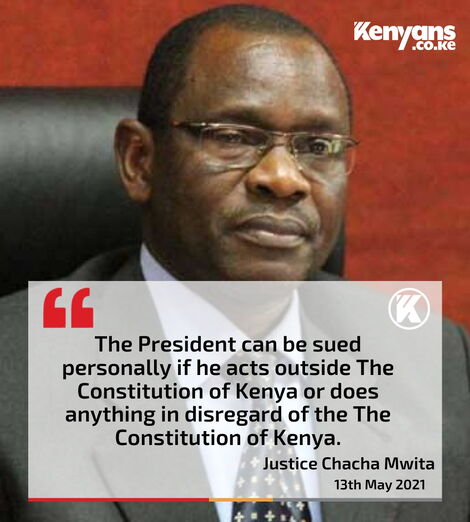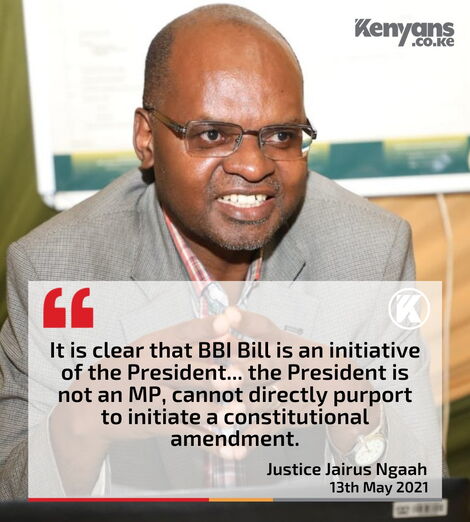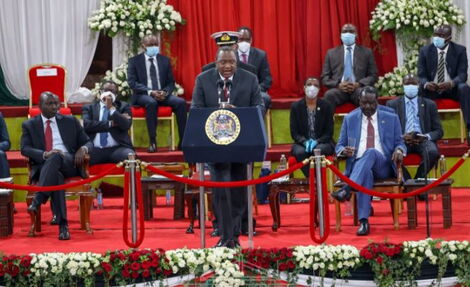-
President Uhuru Kenyatta and Raila Odinga at KICC in Nairobi for the National launch of BBI signatures collection exercise. November 25, 2020.PSCU /Photo Courtesy
-
The High Court on Thursday, May 13 ruled that the Constitutional Amendment Bill 2020 is unconstitutional due to a number of illegalities within the bill and the entire process that came up with the bill.
The ruling came after a five-bench judge of the Milimani Law Courts had been tasked with debating as to whether the BBI petition would proceed to the referendum. The judges were to determine 17 questions raised on the petitions against the BBI process.
The ruling was made by Justice Teresia Matheka, Joel Ngugi, George Odunga, Jairus Ngaah, and Chacha Mwita.
"The steering committee on the BBI was a brainchild of the President, it has no locus standi in promoting constitutional changes as indicated in Article 257 of the constitution, "Judge Ngaah stated.
 Justice Chacha Mwita's ruling on BBI on Thursday, May 13, 2021Photo Courtesy Kenyans.co.ke
Justice Chacha Mwita's ruling on BBI on Thursday, May 13, 2021Photo Courtesy Kenyans.co.keThe judges ruled that the BBI steering committee was not a popular initiative but rather a task force initiated by President Uhuru Kenyatta.
"It is therefore clear as concluded above that the BBI taskforce, which was morphed into the steering committee, was the President's and not the people's initiative.
"It is also quite clear that what was presented as a popular initiative to amend the constitution is, in reality, the President's initiative which is contrary to Article 257 of the constitution," Judge Mwita noted.
The judge also noted that President Uhuru Kenyatta could not be sued during his tenure as the Head of State.
"Criminal proceedings cannot be taken against the President during his tenure as far as legal proceedings are concerned," the judge stated.
The judges further faulted the 70 new constituencies' proposal terming it unconstitutional. They noted that the jurisdiction falls under the Independent Electoral and Boundaries Commission (IEBC).
 Justice Jairus Ngaah's ruling on BBI on Thursday, May 13, 2021 Photo CourtesyKENYANS.CO.KE
Justice Jairus Ngaah's ruling on BBI on Thursday, May 13, 2021 Photo CourtesyKENYANS.CO.KE"The BBI not only unlawfully takes over the functions of IEBC but also allocates constituencies in violation of constitutional principles set out in Article 89 which IEBC is obliged to adhere to in executing its mandate," judge Matheka stated.
The judges also declared all decisions conducted by the IEBC in regards to the BBI bill, including verification of signatures, null and void due to lack of a legal framework.
"It, therefore, follows that all the decisions made by the IEBC in relation to the propose Constitutional Amendment Bill were invalid, null, and void for lack of quorum," Judge Matheka stated.
IEBC was further barred from conducting any exercises regarding the BBI bill. The judges added that all parties that were promoting the bill will bear their own cost and no funds should be directed towards the project.
Conclusions:
1. The Constitution's basic structure doctrine is applicable in Kenya.
2. Basic structure protects certain fundamental aspects of the Constitution from amendment through the use of secondary constituted power or constituted power.
3. The essential features of the Constitution forming the basic structure can only be altered or modified by the people through their sovereign power and not merely through the referendum.
4. From a wholistic reading of the Constitution, its history and the context of the making of the Constitution, the basic structure of the Constitution consists of the foundation structure of the Constitution as provided in the preamble, the 18 chapters and six schedules of the Constitution.
5. The basic structure doctrine protects the foundation, structure and core value of the Constitution but leaves open certain positions as amendable through procedures outlined in Articles 255, 266 and 257 as long as they do not change the basic structure.
6. There are certain provisions in the Constitution insulated from any amendment at all because they are deemed to express categorical core values. These provisions are unamendable and cannot be changed through secondary constituted or constituted power.
7. The sovereign primary constituent power is only exercisable by the people after four sequential processes namely; civic education, public participation and collection of views, constituted assembly debate and referendum.
8. The power to amend the Constitution through referendum route under Article 257 is reserved for the private citizen (Wanjiku only), neither the President nor any state organ is permitted under our Constitution to initiate a constitutional amendment using the popular initiative route.
9. Under Article 143 (3) of the Constitution, the President can be sued in his or her personal capacity during his or her tenure in office, except for action or mission in respect of anything done or not done in the exercise of his or her powers under the Constitution.
10. The Constitution Amendment Bill 2020 which was developed by the BBI Steering Committee and is propagated by the BBI Secretariat is an initiative of the President. The President does not have a Constitutional mandate to initiate amendments through a popular initiative under Article 257.
11. To the extent that the BBI Steering Committee was employed by the President to initiate proposes to amend the Constitution contrary to Article 257, the BBI Steering Committee is an unconstitutional entity.
12. Additionally the BBI Steering Committee is unlawful because the President violated the provisions of Article 132 (4a).
13. In taking initiatives to amend the Constitution other than through the prescribed means in the Constitution, the President failed to respect uphold and safeguard the Constitution and to that extent, he has fallen short of the leadership and integrity threshold set in Article 73 of the Constitution and in particular Article 173 (1a) thereof.
President Uhuru Kenyatta speaking at the BBI launch at Bomas of Kenya in Nairobi on October 26, 2020. By Brian Kimani, Kenyans.co.keTWITTER





